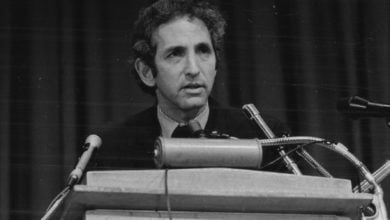Marking a sad day for music lovers around the world, music legend Bo Diddley passed away from heart failure on June 2.
|
Diddley was very outspoken about the injustice and exploitation carried out by the record companies. A lot of people said he was mismanaged, but Diddley pointed out that it was really racism that blocked Black artists. His music developed in the context of Black musical artists living and working in an exploitative, oppressive society. Disenfranchisement of Black people, Jim Crow segregation and KKK racist terror characterized the United States at the time.
Born in 1928 in McComb, Miss., as Ellas McDaniel, Diddley spent his childhood in Chicago, where he received the nickname Diddley.. He learned to play the violin as a child and picked up the guitar after hearing John Lee Hooker’s “Talking Blues”.
Working as a carpenter and mechanic, Diddley began performing on street corners for tips along with his friends. They called their group The Hipsters, later renamed The Jive Cats. In 1951, Diddley got a regular gig at a South Side club. He listened to Hooker, Muddy Waters and the jazz, rhythm & blues of Louis Jordan.
Diddley’s new style of blues reached deep into African traditions that survived and developed in the Americas through centuries of slavery and racist oppression. He began using a rhythm similar to Rumba Clave and Hambone, or “Hand Jive,” now called the “Bo Diddley Beat.”
His first record, “Bo Diddley,” produced at Chess Studios, was released in March 1955. A couple of months later, Muddy Waters responded to the B-side, “I’m a Man,” with his own version, “Manish Boy.”
Later that year, Diddley was invited to perform “Sixteen Tons” on Ed Sullivan’s live broadcast television variety show. Once on stage, he played “Bo Diddley” instead. Ed Sullivan, infuriated, permanently banned Diddley from the show.
In 1956, Chess released Diddley’s mind boggling “Who Do You Love?”—not a typical love song for the time. That same year saw Howlin’ Wolf’s “Smoke Stack Lightning” with only one riff and no chord changes. Chuck Berry’s “Roll Over Beethoven” also arrived.
Many rock ’n’ roll emerging artists emulated Diddley’s infectious rhythm and hip demeanor. Musicians, singers and writers who would later become major performers covered his songs or put new words to the Bo Diddley Beat. Muddy Waters, Buddy Holly, Elvis Presley, Johnny Otis, the Supremes, Temptations, Rolling Stones, Jimi Hendrix, Credence Clearwater, the Grateful Dead, Velvet Underground drummer Maureen Tucker, Patti Smith and the Clash all sampled his style. Diddley also wrote “Love is Strange,” a wonderful and influential song, for Mickey & Sylvia.
Although many musicians, singers and songwriters regarded Diddley’s music highly, record companies, distributors and big radio and television stations did not pay him the same respect. Like many Black musicians of his time, Diddley only got a one-time payment from the record company for his songs recorded in the 50s and early 60s—the best years of his career. Record companies made many millions of dollars off many great blues artists like Diddley without paying any royalties.
He did not make a living from royalties or retire in luxury. He enjoyed performing, but had to keep performing late into his years in order to survive. He played shows until he was 78 years old, when he suffered a stroke followed by a heart attack in late 2007.
Diddley’s music brought the background beat to the fore, focusing on percussive rhythm and exploring the electric guitar’s sonic effects. Some of his most influential songs had no chord changes. He played electric guitar like a percussion instrument. The emphasis on beat and sound shows up throughout not only rock ‘n’ roll but also other music, including forms as varied as funk and minimalism. Aspects of his music further developed in the music of innovators like James Brown and Jimi Hendrix.
Diddley said a few things about death in “Who Do You Love?” Listening to those terrific enigmatic lines, such as “You should’a heard just what I seen.” “Take a little walk”—and see if you can say that Bo Diddley is truly dead.







